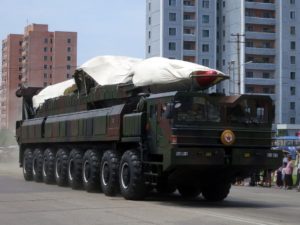
By Dr. Arshad M. Khan
Pyongyang tested another intercontinental ballistic missile on Wednesday. Fired nearly vertically, it reached an altitude of 4500 km (2800 miles). That means it could travel 13,000 km (8150 miles) on a standard trajectory, according to the Union of Concerned Scientists, putting the entire continental U.S. within its range.
In September, the North Koreans conducted a sixth nuclear test. And the story is they already have a small hydrogen bomb to fit atop a missile.
Perhaps weighted with a warhead, the missile will travel a few miles less but Kim Jong Un can still land one on the White House … if he felt so inclined. Will he? Of course not. He may be bad, but he’s not mad.
In fact, if we ask the question, how many countries has North Korea meddled in or attacked, the answer is none. Turn it around and ask the same question of the U.S., and the response is dozens — often to possible short-term advantage and long term disaster.
As to what the U.S. can do about the missile and bomb tests, the short answer is nothing. Yes, a Security Council meeting has been called for by Rex Tillerson, and yes, there will be more sanctions. But North Korea is already the most sanctioned country in the world, and it has had zero effect. Further sanctions will make little difference. They have the Chinese lifeline and China will never allow a South Korea that has swallowed the North on its doorstep. It prefers a buffer state.
The fact remains, nuclear weapons have become a form of insurance for small states. Kim Jong Un has seen what happened to Muammar Gaddafi in Libya. He abandoned his quest for nuclear weapons in exchange for economic progress and rapprochement with the West. It was a fatal miscalculation. Libya was destroyed and he lost his life.
Saddam Hussein made a similar mistake in Iraq. It might have been apparent to thinking observers why Hans Blix, the Swedish diplomat and former Foreign Minister heading the International Atomic Agency, and his team had not discovered any Weapons of Mass Destruction. The Bush team ignored him, came up with the notorious slogan of ‘the smoking gun will be a mushroom cloud’ and went ahead with the Iraq invasion. When no WMD were found, they changed the mission to bringing democracy in Iraq. The country is devastated.
The result of these military adventures is at least a million dead, millions more displaced, a refugee crisis causing dissension in Europe, and a Britain exiting the EU. The economic cost to the U.S. is in the order of $5 trillion.
Mr. Kim’s major lesson is survival. And nuclear weapons serve as guarantee. His father Kim Jong Il might have been interested in trading nuclear capacity for economic aid and peace. Kim Jong Un would rather have the certainty of survival, and bargain from strength.
A callow youngster in his twenties when he succeeded his father, he is now at 33 firmly in power. He has eliminated opposition ruthlessly, playing off factions and executing or purging over 300, and his calculated ‘madness’ instills fear worldwide, most notably in his own country.
Nothing if not practical, he is quietly cultivating a private sector economy, as in China, to improve economic conditions. Less a fool, he has become a force to be reckoned with.
This article was published by Modern Diplomacy on 1/12/2017
